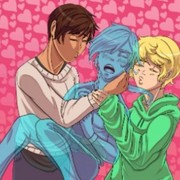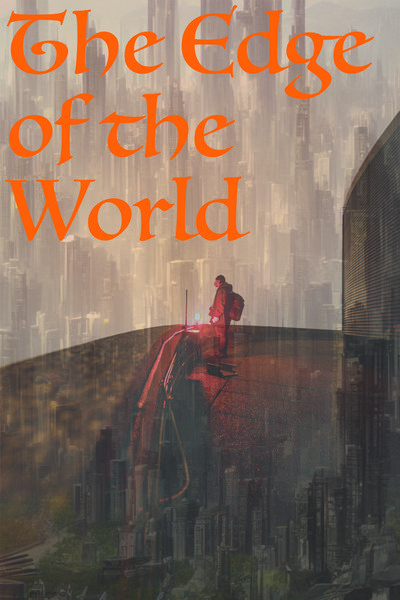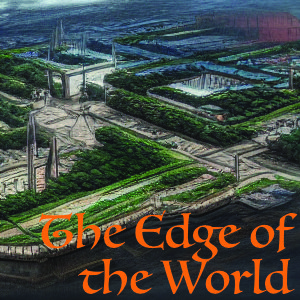Samuel had been dressed in silver cloth with blue accents. He practically shimmered in the light pouring through the church's large doorway behind him. Ahead of him, Nikolaus was dressed in a military blue with hints of silver. Perfect opposites. They were meant to complement one another it seemed. Although Samuel looked with jealousy on the thick, fur trimmed cloak of estate that Nikolaus had been allowed to wear for the ceremony. Samuel fought back any ill feeling the sight of the cloak was provoking in him. He refused to be seen shivering, or worse yet, blushing at having to display his bare torso to the slavering crowds of strangers.
Nikolaus was staring at Samuel, just as hard as Samuel was staring at him. The Prince's face nonetheless remained unreadable, although it had to be said, he never once looked away. Nikolaus held Samuel’s eyes in his. Perhaps it gave Samuel just a little courage.
With his eyes fixed, and his best diplomatic expression plastered on, Samuel began the long, slow walk down the aisle. Around him were murmurs that he refused to listen to or acknowledge. After just a few steps though, following some unseen cue, everything else was forgotten as the invisible choir broke out in peals of song that filled the church and reverberated off every surface. It made Samuel jump out of his skin for a moment, before he managed to pull himself back together again, hoping that no one else had seen his look of surprise.
The choir sang and sang, their words, words from some holy book he assumed. The harmonies spun around him as he walked and listened and stared at the man ahead of him.
“And the third day there was a marriage in Cana of Galilee; and the mother of Jesus was there: And both Jesus was called, and his disciples, to the marriage. And when they wanted wine, the mother of Jesus saith unto him, They have no wine. Jesus saith unto them, Fill the waterpots with water. And they filled them up to the brim.”
Samuel tried to walk neatly, remembering how graceful Nikolaus had been at the ball, how graceful he looked even now ahead of him. But it was of little use. The clothing was too new to him, and he knew that he must resemble something akin to a hippopotamus. He was only glad that the choirs chanted-singing drowned out any sniggers from the onlookers.
“And the Lord God said, It is not good that the man should be alone; I will make him an help meet for him.”
Was this what he was to be then, he wondered, staring at the solid and imposing prince before him; the help meet for this man? A helper as his partner?
“And Ruth said, Intreat me not to leave thee, or to return from following after thee: for whither thou goest, I will go; and where thou lodgest, I will lodge: thy people shall be my people, and thy God my God: Where thou diest, will I die, and there will I be buried: the Lord do so to me, and more also, if ought but death part thee and me.”
‘For now! Only for now!’ Samuel repeated the mantra to himself with every step.
“And Saul said to him, Whose son art thou, thou young man? And David answered, I am the son of thy servant Jesse the Bethlehemite. And it came to pass, when he had made an end of speaking unto Saul, that the soul of Jonathan was knit with the soul of David, and Jonathan loved him as his own soul. And Saul took him that day, and would let him go no more home to his father’s house. Then Jonathan and David made a covenant, because he loved him as his own soul. And Jonathan stripped himself of the robe that was upon him, and gave it to David, and his garments, even to his sword, and to his bow, and to his girdle. And David went out whithersoever Saul sent him, and behaved himself wisely; and he was accepted in the sight of all the people, and also in the sight of Saul’s servants.”
As he got closer to the east end of the church, to the priests and to Nikolaus, Samuel became only too aware of the Sovereign Prince’s eyes on him also, boring into him, judging him.
“And Jonathan caused David to swear again, because he loved him: for he loved him as he loved his own soul. I am distressed for thee, my brother Jonathan: very pleasant hast thou been unto me: thy love to me was wonderful, passing the love of women.”
As Samuel finally reached his destination, he looked up into Nikolaus’ eyes for a final brief moment. The prince’s warm hand closed over his own, and he allowed himself to be led the last few steps to the kneeling rail that had been set out, and without anyone seeing, Nikolaus surreptitiously lifted the font of Samuel’s robe so that he could kneel without tripping and making a mess of things. As they both knelt there, in front of the priests, the last strains of the choir washed over them, and Nikolaus withdrew his hand, and Samuel oddly missed its loss.
“And Jesus saith unto them, Draw out now, and bear unto the governor of the feast. And they bare it. When the ruler of the feast had tasted the water that was made wine, and knew not whence it was: the governor of the feast called the bridegroom, And saith unto him, Every man at the beginning doth set forth good wine; and when men have well drunk, then that which is worse: but thou hast kept the good wine until now. This beginning of miracles did Jesus in Cana of Galilee, and manifested forth his glory; and his disciples believed on him.”
The rest of the ceremony passed Samuel by in a blur of words and actions that held great meaning, most of which were obvious to everyone else but of which he remained woefully ignorant. There were prayers and exhortations. The Sovereign Prince spoke. Samuel responded to the words of the Archpriest as well as he was able, affirming what was happening even as he despaired of its present necessity. He made vows like Ruth’s, and at one point Nikolaus had stood up, and taken his heavy cloak off, and had wrapped the mantle around Samuel with his own hands. So now Nikolaus knelt beside him with his broad chest on display and Samuel was all covered up in the cloak he had been so jealous of. Yet Samuel still felt the more conspicuous of the two, now wrapped in Nikolaus’ clothes; clothes that he was painfully aware were still warm from the prince’s own body heat.
Rough, beaten gold circlets, set with many-hued stones had been placed on their heads as the priests had intoned the prayer: “Thou hast set upon their heads crowns of precious stones; they asked life of thee, and thou gavest it them. For thou wilt give them thy blessing forever and ever: thou wilt make them to rejoice with gladness through thy presence.”
He had been given bread to eat, like the thin wafer that he’d seen through the doorway that Nikolaus had brought to the Christians in the city; and together they had each drunk wine from the same cup.
Everything had seemed to come to a close as the Archpriest had prayed mightily over them: “O God, our God, who didst come to Cana of Galilee, and didst bless there the marriage feast: Bless, also, these thy servants, who through thy good providence are now united together in wedlock. Bless their goings out and their comings in: replenish their life with good things: receive their crowns into thy kingdom, preserving them spotless, blameless, and without reproach, unto ages of ages.”
Samuel had jumped as the whole gathering had broken out into a loud, “Amen!” at that point.
After all of that, they had walked out together, down the aisle, side by side into the sunshine and into air dazzling with even more pealings of bells, and Samuel almost shrank back at the sight of the crowds in front of him, but Nikolaus’ firm guiding hand on his arm kept propelling him forward.
On the steps of the church had been set up another kneeler, and something like a portable altar covered in heavy cloth and regalia, and a table laden with parchment and a pot of melting wax. Nikolaus took Samuel to the kneeler and stood there as they waited for the Prince to appear with the Priests. It wasn’t over it seemed.
Instead, the heralds next to the Prince proclaimed in the Prince’s name the marriage of Nikolaus-August, and Samuel-Constans. It was at that moment Samuel discovered that he had apparently received a new name. The people meanwhile cried out an acclamation in response to the heralds, although the cry seemed lacklustre at best and even the Sovereign Prince quirked a brow, and Nikolaus stiffened beside Samuel, going on alert.
What followed was more ritual, acclamation, ceremony. At a certain point Samuel was directed to kneel. The priest picked up a diadem from off the portable altar. The diadem matched the one that was already sitting on Nikolaus’ head, and had been throughout the whole wedding, deftly set within his marriage-crown. The priest prayed and handed it to the Sovereign, who took it and offered his own prayer over the circle of delicate metal and precious stone, before handing it to his son.
Nikolaus turned towards Samuel, there was a hint of hesitation at that moment, the only one Samuel had seen all day, it passed like a shadow. Reverently Nikolaus kissed the diadem, before turning it and holding it down for Samuel to also kiss. Samuel pecked dutifully at the metal, his breath misting the spot that Nikolaus’ own breath had touched a moment before.
With utmost care Nikolaus set the diadem onto Samuel’s head, adjusting it to sit well and firm. Then, reaching out his hand, Nikolaus raised Samuel to his feet and drew him in beside himself, and the crowds, both those outside, but also those within the church cried out in a loud voice: “Most fortunate! Most fortunate! Most fortunate!”
What followed was paperwork, as great charters were set upon the nearby table, each one read out and pressed with the Prince’s Great Seal of State. Parchments and pages that proclaimed the marriage of Nikolaus and Samuel; Samuel’s renunciation of citizenship, made without any input from him; and the recognition of Samuel-Constans as a Prince of Aerska en Cantaer.
With the signing and sealing of the last document and their copies, two soldiers immediately came forward. One was Markus, and Samuel smiled to see his friend — or at least the closest thing he had to a friend in these parts. With Markus was another soldier, he looked familiar, and Samuel eventually clicked, that this was the soldier that the Prince had been talking to the day beforehand, when they’d stopped for lunch, the one who had sped off in front of the caravan.
The two men were each handed a packet containing copies of the charters just sealed. With a smile and a wink towards Samuel, Markus didn't lose a moment. Turning smartly on his heel, with his compatriot close behind him, the two soldiers made there way down the steps and immediately mounted waiting horses. As Samuel watched uncertainly, the two riders cantered off in opposite directions, Markus heading towards the town and the South, the other rider heading towards the forest, and the north.
Samuel was pulled away from any further musings as the whole morning reached its crescendo and finale, the herald-deacons raising their voices to proclaim in loud tones: “Unto our most God-fearing Rulers, the Sovereign Princes Alexandre and Eirene, grant, O Lord, length of days, a peaceful life, health, salvation and prosperity in all things; as also, conquest and victory over their enemies; and preserve them for many years.”
And the responding shouts of: “Many Years”, were deafening.
The heralds immediately followed up calling: “Many years to the most fortunate Princes”
“Many years! Many Years! Many Years!”
In a tide of celebration, mixed with unanswered questions and an uncertain populace whose world had been turned upside down between breakfast and lunch, much as Samuel’s own had been, the royal party were swept away from the monastery and back towards the township in a wave of people and pageantry.
And indeed, Samuel didn’t need shoes even then, just as Markus had promised him, since he was bodily picked up at that point by some of the bolder members of the local nobility and plonked into a litter, alongside his, now-husband, Nikolaus, and carried through the crowds.
Nikolaus reclined in the litter and took it all in his stride. Calm, cool, collected. As prince and heir he was a public commodity, and on a day like this, prepared to let the people have their pound of flesh. Beside him, Samuel sat like an ungainly toadstool, and wished for it all to come to an end.











Comments (0)
See all